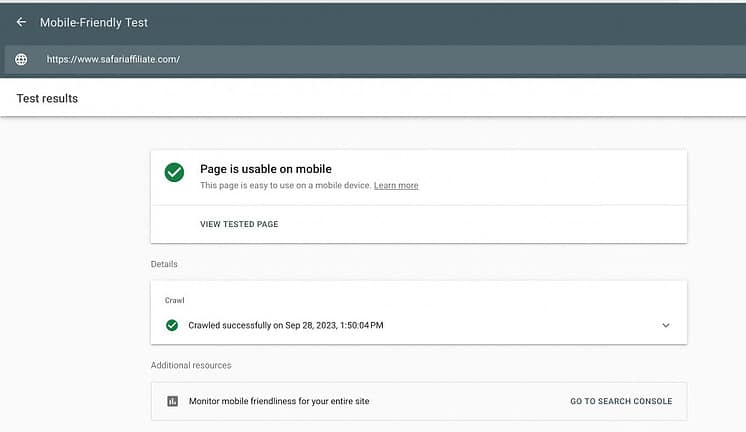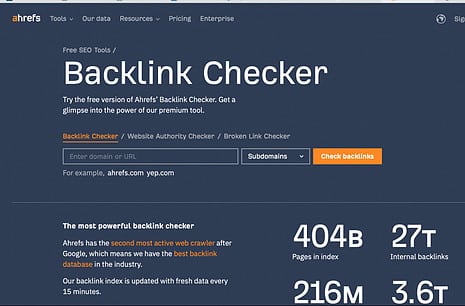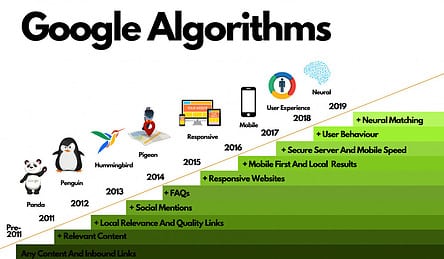 The position of SEO (Search Engine Otimzation) in attracting organic traffic to your website cannot be gainsaid. SEO has long been the cornerstone of successful online marketing strategies and affiliate business. However, as search engine algorithms and SEO best practices continue to evolve, it has also become a breeding ground for misinformation, outdated information, misconception, misguided tactics and even myths. Beginners are the easiest targets for such.
The position of SEO (Search Engine Otimzation) in attracting organic traffic to your website cannot be gainsaid. SEO has long been the cornerstone of successful online marketing strategies and affiliate business. However, as search engine algorithms and SEO best practices continue to evolve, it has also become a breeding ground for misinformation, outdated information, misconception, misguided tactics and even myths. Beginners are the easiest targets for such.
One of the major causes of this problem is the fact that Google’s ranking algorithm is very dynamic and somewhat of a black box. With Internet being a sea of unverified claims and quick-fix solutions on matters SEO, the situation can only get worse.
Mistakes and errors in SEO strategies are detrimental to a website’s search engine rankings and overall visibility. SEO myths can potentially cost you a lot of time, effort, and resources. Luckily in recent times, Google has taken positive steps to enhance transparency through increased activity in the SEO blogosphere.
11 Common SEO Mistakes and Solutions
SEO mistakes can happen for a variety of reasons, often stemming from human error, misinterpretation of best practices, or changing search engine algorithms. So, which are these common SEO mistakes?
#1. Keyword Stuffing – This involves excessive keywords in your content to manipulate search rankings. This not only results in poor-quality content but can also lead to penalties from search engines. Keyword density can actually harm the readability and authority of your content. Besides conducting an analysis of your content and calculaing the keyword density manually (no. of times a keyword appears/total word count), there SEO tools like Yoast SEO that can help you to compute the density. Hubspot, a major SEO player, recommends 1-2% keyword desnity.
#2. Disregarding Mobile Optimization – Failing to ensure that your website is mobile-friendly can lead to poor user experiences and lower search rankings since Google considers mobile-friendliness a ranking factor. There are currently free tools such Google Mobile-friendly Test and PageSpeed Insight that can assist you to test your websites for readiness to mobile devices. You can also aly mobile-friendly design framework such as Bootstrap, Foundation and Materialize CSS. Many content management systems (CMS) such as WordPress have plugins that help in optimzing for mobile devcies.
 #3. Ignoring On-Page SEO – Not optimizing on-page elements like titles, meta descriptions, headers, and image alt text can hinder your website’s visibility in search results. Free tools such as Google Search Console, Ahrefs, Google Analytics, Varvy SEO Tool, Yoast SEO for WordPress among others will come in handy to assist you address on-page optimization.
#3. Ignoring On-Page SEO – Not optimizing on-page elements like titles, meta descriptions, headers, and image alt text can hinder your website’s visibility in search results. Free tools such as Google Search Console, Ahrefs, Google Analytics, Varvy SEO Tool, Yoast SEO for WordPress among others will come in handy to assist you address on-page optimization.
#4. Failure to Adress User Experience (UX) – User exerience is at the core of Core Web Vitals (CWV), some performce metrics by Google. Poor user experiences, such as difficult navigation, intrusive pop-ups or slow-loading websites can lead to higher bounce rates and negatively impact SEO. Besides the obvious techniques such as conducting customer feedback and surveys, Google Analytics is one tool that can give you an insight into your customers’ behaviours.
#5. Un-Optimizied Images – If you do not compress and properly label the images in your content, it can affect page load times and overall user experience. Make sure also that the Alt text for images should are descriptive. There are many online tools and and plugins such as Robin Image Optimizer for WordPress, TinypNG, Kraken.io, Squoosh and many more that can help you to optimize your images for free.
 #6 Ignoring Technical SEO – If you neglect the technical aspects of your websites such as URL structures, canonical tags, and XML sitemaps, it hinder search engine crawlers’ ability to index your site. In addition to the tools for on-page optimization, Google Search Console in particular will helpin addressing the techncial SEO issues.
#6 Ignoring Technical SEO – If you neglect the technical aspects of your websites such as URL structures, canonical tags, and XML sitemaps, it hinder search engine crawlers’ ability to index your site. In addition to the tools for on-page optimization, Google Search Console in particular will helpin addressing the techncial SEO issues.
#7. Poor Backlink Practices – Engaging in black-hat link-building techniques or acquiring low-quality backlinks can result in penalties. It’s important to focus on acquiring high-quality and relevant backlinks. Ahrefs free backlink analysis tool provides detailed insights into your own and your competitors’ backlinks, including anchor text, referring domains, and much more.
#8. Not Monitoring SEO Performance – Failing to track key SEO metrics and monitor changes in rankings and traffic can prevent you from making necessary adjustments to your strategy. All the tools mentioned above plays a role in monitoring the performance of your SEO efforts.
#9. Not Optimizing for Local SEO – You stand to gain immensely when you optimize for local SEO. This include appearing in the Local Pack or 3-Pack, which is the section of Google’s search results that showcases local businesses with map listings. For businesses with physical locations, if you do not optimize for local SEO can lead to missed opportunities for attracting local customers.
#10. Skipping XML Sitemap Submission – When you fail to submit an XML sitemap to search engines, you may encounter incomplete indexing, slower indexing, crawling difficulties which may cause search engines to miss some of your pages. Its detrimental to your overall SEO performance. Google XML Sitemaps (WordPress Plugin) is a popular WordPress plugin that generates an XML sitemap for your WordPress site. It’s easy to use and allows you to customize the sitemap’s content and frequency of updates. Other free tools include Google Search Console and SEMrush.
#11. Ignoring Social Media – Social signals, such as likes, shares, and comments, can indirectly influence SEO. Ignoring the impact of social media in SEO may result in missed opportunities for engagement and backlinks.
To avoid these common SEO mistakes, it’s important to stay informed about best practices, regularly audit your website, and keep up with search engine algorithm updates. Additionally, consider seeking advice from SEO professionals or using reputable SEO tools to optimize your website effectively.Top of Form
8 Common SEO Myths and Facts
While errors and mistakes can be corrected, myths are hard to address because are often inbuilt in an individual. SEO is often surrounded by myths and misconceptions. These myths can lead to confusion and misinformed SEO strategies.
Here are some of the common SEO myths you should be aware of:
 Myth#1: SEO is a One-Time Effort – To the contrary, SEO is an ongoing process. While initial optimizations are important, search engines constantly update their algorithms, and competitors are also working on their SEO. To maintain or improve rankings, continuous efforts are required.
Myth#1: SEO is a One-Time Effort – To the contrary, SEO is an ongoing process. While initial optimizations are important, search engines constantly update their algorithms, and competitors are also working on their SEO. To maintain or improve rankings, continuous efforts are required.
- Myth#2: SEO Is All About Keywords – While keywords are important, SEO is not just about stuffing content with keywords. It also involves factors like user experience, backlinks, mobile-friendliness, and content quality.
- Myth#3: More Backlinks Are Always Better – Quality matters more than quantity when it comes to backlinks. Low-quality or spammy backlinks can harm your SEO. Learn more about backlinks best practices.
- Myth#4: SEO is All About Ranking #1 – Ranking first is desirable, but it’s not the only measure of SEO success. The goal is to attract relevant organic traffic and conversions. Lower rankings can still bring in valuable visitors.
- Myth#5: Meta Tags Have a Huge Impact on Rankings – While meta tags like title and meta description are important for click-through rates, they have a relatively small direct impact on rankings compared to other factors like content quality and backlinks.
- Myth#6: SEO is All About Gaming the System – SEO is not about tricking search engines but about providing valuable content and improving user experience. Tactics like cloaking can lead to penalties.
- Myth#7: HTTPS Doesn’t Matter for SEO – Google considers website security as a ranking factor. Websites with HTTPS (SSL certificates) are favored over non-secure sites.
- Myth#8: SEO i: SEO is All About Google – While Google is the dominant search engine, optimizing for other search engines like Bing is also important, especially for niche markets.
Summary- Basic SEO Tips for Beginners
SEO can be a comçlex topic, but it is important for any business that wants to be visible online. As a beginner, you are in a very precarious position to easily fall for the mistakes and myths above. To avoid falling into this abyss, here are some basic tips to keep in mind when starting your SEO journey:
- Start with a solid foundation – Make sure your website is well-designed and easy to navigate.
- Track your results – Use Google Search Console and other SEO tools to track your website’s ranking in the SERPs and identify areas where you can improve.
- Don’t try to do everything at once – SEO is a long-term process, so it’s important to focus on a few key things at a time.
- Don’t be afraid to experiment – There is no one-size-fits-all approach to SEO. What works for one website may not work for another.
- Be patient – It takes time to see results from SEO. Don’t get discouraged if you don’t see results immediately.

- Consult Google’s Guidelines – Google provides official guidelines and resources for webmasters and SEO practitioners. Familiarize yourself with Google’s Webmaster Guidelines and SEO Starter Guide to understand best practices
- Understand Google’s Algorithm Updates – Keep track of Google’s algorithm updates, such as Panda, Penguin, and BERT. Google often releases information about significant updates, so you can adapt your SEO strategy accordingly.
- Participate in SEO Communities – Join online SEO communities and forums where professionals discuss their experiences and share insights. Engaging with peers can help you separate fact from myth. Google’s Webmaster Central Blog and Moz are reliable sources.
- Seek Professional Advice When Needed – If you’re unsure about a particular SEO aspect or strategy, consider consulting with an experienced SEO professional or agency. They can provide expert guidance tailored to your specific needs.
Jeff
Safari Affiliate
